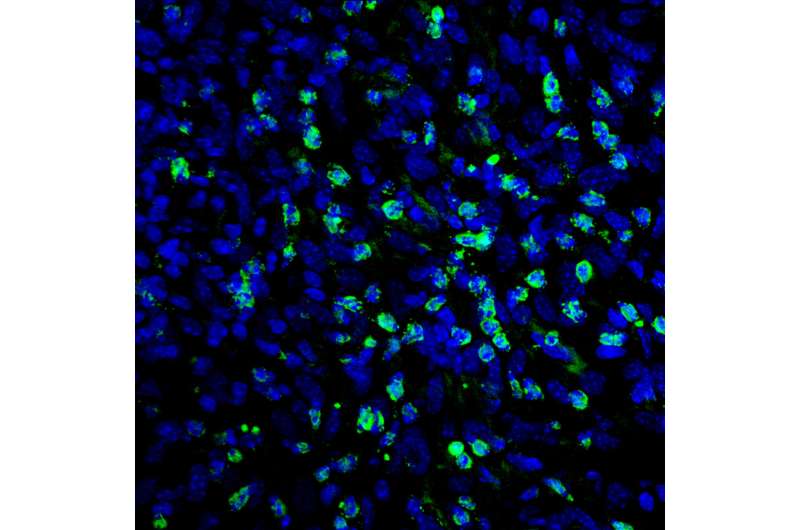This article has been reviewed according to Science X's editorial process and policies. Editors have highlighted the following attributes while ensuring the content's credibility:
fact-checked
peer-reviewed publication
trusted source
proofread
Heart medication improves the efficacy of current treatments for melanoma in mouse models

A collaborative study undertaken by the Navarrabiomed Biomedical Research Center (Pamplona, Navarre), the Institute of Neurosciences CSIC-UMH (Sant Joan d'Alacant, Valencian Community) and IRB Barcelona (Barcelona, Catalonia) shows that the administration of ranolazine, a drug currently used to treat heart conditions, improves the efficacy of current therapies for melanoma, in mouse models of this disease.
The journal Nature Metabolism has published the results of the study, which offers an alternative therapeutic approach to treat melanoma, the most deadly type of skin cancer, which affects 16.3 women and 14.6 men per 100,000 inhabitants in Spain.
The development of future clinical trials to validate and confirm the action of ranolazine in cancer patients will be facilitated by the fact that it has already been approved for use in humans and is being administered in clinical practice to treat chronic angina.
Details about the study
In most cases, patients with melanoma respond well to therapies directed against one of the key genes in tumor progression, namely BRAF. However, they soon develop resistance to these therapies and the tumors grow back. In addition, the latest clinical studies suggest that these patients show a poorer response to immunotherapy.
This study has provided a deeper understanding of the role of fatty acid metabolism in the development of resistance to BRAF inhibitors and demonstrated the capacity of ranolazine to slow down tumor progression. More importantly, this drug increases the visibility of melanoma cells to the immune system, thereby improving response to immunotherapies and increasing the ability of lymphocytes to control tumor growth.
Multicenter study
The research has been coordinated from Navarrabiomed by Dr. Imanol Arozarena Martinicorena, head of the Cancer Signaling Unit, and is part of the doctoral thesis by Marta Redondo Muñoz (Public University of Navarre), a researcher in the same unit.
The work has been carried out in close collaboration with the Institute of Neurosciences, involving Dr. Francisco Javier Rodríguez-Baena, under the direction of Dr. Berta Sánchez Laorden, principal investigator of the Cellular Plasticity in Development and Disease group, and with IRB Barcelona, where the ICREA researcher Dr. Salvador Aznar Benitah leads the Stem Cells and Cancer lab, as well as the translational laboratory Systemic Metabolic Alterations in Cancer.
Navarrabiomed has designed and managed the development of the project, and also carried out experiments related to resistance to targeted therapies and the study of how ranolazine affects the immunogenicity of melanoma cells.
"This study demonstrates that it is possible to pharmacologically reorganize the metabolism of the tumor cell to improve the effect of targeted therapies and immunotherapies. The next challenge is to demonstrate the clinical effect of these combinations in patients and study the potential of ranolazine in other types of cancer. To do this, we need to better understand how this drug acts both in tumor cells and in the immune system," says Dr. Imanol Arozarena.
The Institute of Neurosciences (a joint center of the CSIC and the Miguel Hernández University), conducted the immunotherapy trials with mice and the study of immune cells in the tumor microenvironment.
"Immunotherapy has established itself as a fundamental therapeutic strategy for melanoma and other types of cancer. Despite this, many patients do not respond optimally to these treatments. This work shows the beneficial impact of the combination of ranolazine with immunotherapy in preclinical models of melanoma, thus supporting its possible application in patients," says Dr. Berta Sánchez-Laorden.
Scientists at IRB Barcelona performed single-cell RNA sequencing analyses, which have revealed in detail the effect of ranolazine on the metabolic state of tumor cells. "We suspected that fatty acid metabolism was crucial in the most aggressive forms of melanoma, but being able to confirm this with a drug already approved for use in humans is highly relevant. Hopefully, these results can pave the way to change clinical practice," says Dr. Aznar Benitah.
Incidence
In 2022, 7,500 new cases of skin melanoma were diagnosed in Spain. Worldwide, this type of cancer accounts for 3.4% of the total number of cancer cases detected. Despite accounting for only 10% of skin cancer cases, melanoma is responsible for 90% of deaths associated with skin tumors.
Thanks to the development of targeted therapies and immunotherapies, the clinical treatment of individuals with melanoma has improved, but 50% of patients are still unresponsive and/or acquire resistance to these therapies. The combination of current therapies with ranolazine would offer a therapeutic alternative for these patients, improving their clinical response.
More information: Metabolic rewiring induced by ranolazine improves melanoma responses to targeted therapy and immunotherapy, Nature Metabolism (2023). DOI: 10.1038/s42255-023-00861-4 , www.nature.com/articles/s42255-023-00861-4



















